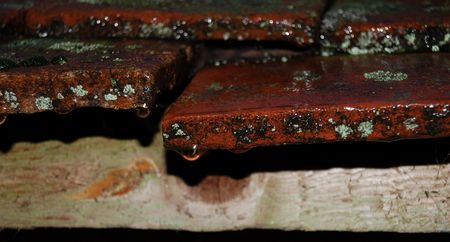De Uropi vord "liuv" - the Uropi word "liuv"
Uskulpe ma. In mi fori artikel i oblasì de tekste in Uropi id in Engli: Zi lu se.
I'm sorry. In my previous article I forgot the texts in Uropi and in English: Here they are.
★ ★ ★
Liuvi liame
Ploji fluje
Wen vinte lij
Su vaile…
Melankolij.
Rainy loves
Weeping flows
Windshed
On the willows
Melancholy
★ ★ ★
★ ★ ★
De Uropi vord "Liuv"
★ ★ ★
Obte de Uropi vord "liuv" ven od Espani "lluvia", je sin ne te Kastijani vid treten favorim in Uropi.
Je ste nun komùn Indo-Europan rod po liuv, wim je se de kaz po sol, vint o snev. De I-E rod *wersā = liuv, vid solem finden in Sanskriti varṣám, id in Hindi varšā; de I-E verb *sūweti = liuvo, vid solem finden in veti Greci ὕει "huei" = je liuv, id in Albàni: shi = liuv. De vorde po liuv in moderni Europan lingas se vari id disemi, od Franci pluie a Itali pioggia, a Portugi chuva, i.s.p… (tale odvenan od Latini pluvius); od Germàni Regen / rain a Slavi: (Rusi дождь "doʒdj", Polski deszcz, Kroati kiša), a novi Greci βροχή "vrocí", i.s.p…
Pur, wan un opre de procekade do vorde sinan fluidi, flujo, lijo, mujo, lavo… un moz findo un eki unid par mole od da vorde se formen ki foneme semli a daze "liuvi".
Prim je ste de I-E rod pleu-* = flujo, snivo, lijo we davì Greci πλεω "pleô" = snivo id πλύνω “plunô”, Armèni leval = lavo, Lat. pluvius = liuv (vize sube), Do. fließen, Nor. flyte, Niz. vloeien = flujo, tal wim Latini fluereflujo (od I-E bhleu-*), It. fluire, Esp. fluir = flujo. (= Uropi flujo we se nerim de anagràm liuvi: "ljufo"). =
Pos nu av de I-E rod lowō* = lavo, we davì Greci λούω “luô” = lavo, bano, Lat. lavo = Uropi lavo, diluo = trumujo, inluzo > diluvium = suflùj, disliùv > It., Esp. diluvio, Por. dilúvio, Kat. diluvi, Fr déluge, i.s.p… = Ur disliùv) id os Kimri gwlaw, id Bretàni glav = liuv.
De sinad lijo vid finden in de I-E rod lei-* = lijo, flujo > we davì Kimri lli = mar, flud, llif, Bret. liñvad = suflùj, Rusi лить “litj”, Kroati lijevati, Tceki líti = lijo, liják = liuvifàl, Lituvi lieti = lijo, lietus = liuv (od wo Lituvia ?: in Lituvi Lietuva = liuvilànd ?), Latvi lietus = liuv, liet = Uropi lijo. Nu moz os ajuto de I-E rode leikw-* = laso > Latini linquo = laso id liqueo = so fluidi, liquidus > It., Esp. liquido, Fr liquide = fluidi, id I-E leg-* = gopo > Kimri llaith, Bret. leiz = muj, Do. Leck, Eng. leak, Niz. lek, Da. læk , i.s.p… = vodilìg).
Po kokluzo, un moz os dezo te liuv se oʒe neri, tra ji zone, a Cini shui = liuv. Wim i dezì ʒa in u fori artikel, jaki Uropi av ji siavi històr (id geografij).
★ ★ ★
★ ★ ★
The Uropi word "Liuv", the rain
★ ★ ★
Although the Uropi word liuv comes from Spanish "lluvia," it doesn't mean that Castilian receives any preferential treatment in Uropi.
There is no common Indo-European root for rain, as it is the case for sun, wind or snow. The I-E root *wersā = rain, can only be found in Sanskrit varṣám, and in Hindi varšā; the I-E verb *sūweti = to rain, can only be found in ancient Greek ὕει "huei" = it's raining, and in Albanian: shi = rain. The terms used for rain in modern European languages are different and varied, from French pluie to Italian pioggia, to Portuguese chuva, etc… (all stemming from Latin pluvius); from Germanic Regen / rain to Slavic: (Russian дождь "dozhd'", Polish deszcz, Croatian kiša), to modern Greek βροχή "vroshí", etc…
However, when you open up your research on to terms meaning liquid, to flow, to pour, to wet, to wash… you will find a certain unity because many of those terms are formed with phonemes which are close to those of "liuv".
First we have the I-E root pleu-* = to flow, to swim, to pour which gave Greek πλεω "pleô" = to swim and πλύνω “plunô”, Armenian leval = to wash, Lat. pluvius = rain (see above), Ger. fließen, Nor. flyte, Dutch vloeien = to flow, as well as Latin fluere = to flow (from i-e bhleu-*), It. fluire, esp. fluir = to flow. (CF Uropi flujo which is almost an anagram of liuv: "liufo").
Then we have the I-E root lowō* = to wash, which gave Greek λούω “louô” = to wash, to bathe, Lat. lavo = to wash(CF Uropi lavo) > diluo = to soak, to dilute > diluvium = flood, deluge > It., Esp. diluvio, Por. dilúvio, Cat. diluvi, Fr déluge (= Ur disliùv) as well as Welsh gwlaw, and Breton glav = rain.
Terms meaning to pour are found in the I-E root lei-* = to pour, to flow > which gave the Welsh lli = sea, tide, llif, Breton liñvad = flood, Russian лить “lit’”, Croatian lijevati, Czech líti = to pour, lijákshower, Lithuanien lieti = to pour, lietus = rain (hence Lithuania ?: in Lithuanian Lietuva = rainland ?), Latvian lietus = rain, liet = to pour (= Uropi lijo). We can also add the I-E roots leikw-* = to let > Latin linquo idem and liqueo = to be liquid, liquidus = It., Esp. liquido, Fr liquide, Eng. liquid and I-E leg-* = to drip > Welsh llaith, Bret. leiz = wet, Ger. Leck, Dutch lek, Da. læk , etc… = Eng. leak.
To conclude, we could even say that liuv is also close to Chinese shui = rain as far as sounds are concerned. As I already mentioned in a previous article, each Uropi word has its own history (and geography).


/https%3A%2F%2Fprofilepics.canalblog.com%2Fprofilepics%2F2%2F7%2F277026.jpg)




/http%3A%2F%2Fstorage.canalblog.com%2F42%2F21%2F321345%2F133835185_o.jpeg)
/http%3A%2F%2Fstorage.canalblog.com%2F60%2F50%2F321345%2F131836320_o.jpg)
/http%3A%2F%2Fstorage.canalblog.com%2F73%2F77%2F321345%2F130540623_o.jpg)
/http%3A%2F%2Fstorage.canalblog.com%2F46%2F98%2F321345%2F129165442_o.jpg)